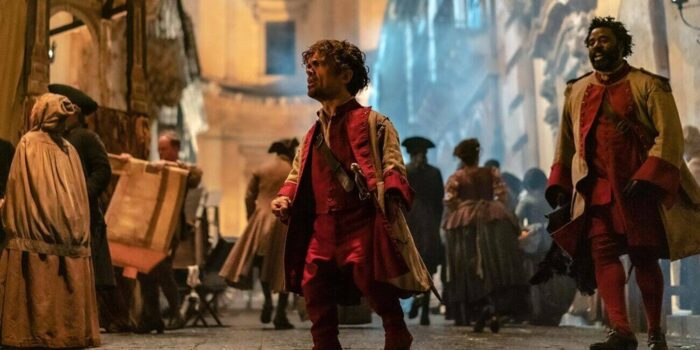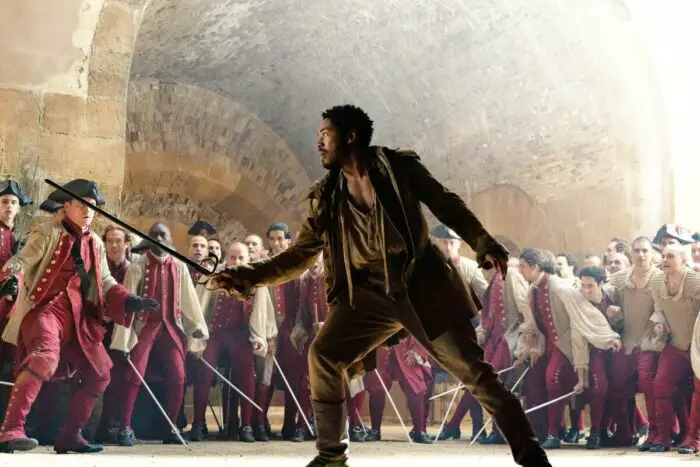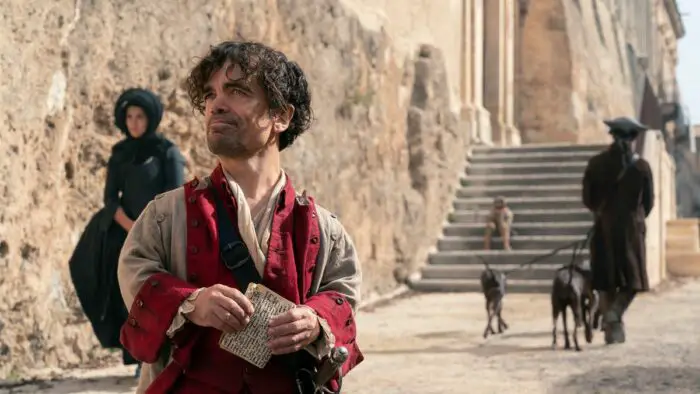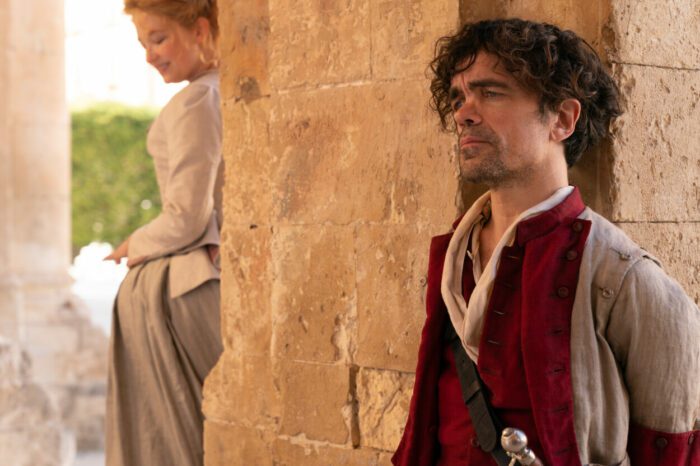Cyrano is an over-the-top, highly affected, and quite silly cinematic anomaly. Fusing orthodox musical/period piece beats with postmodern flourishes and stylistic informalities, it’s too absurd to take literally, too maudlin to take sentimentally, too scrupulous to take slovenly, and too playful to take seriously. And yet, it works: precisely because of its mopey flourishes and excessive orotundity. Joe Wright’s mercurial & loose-handed approach to the source material is slyly tailored to his underlying message. The dazzling swordplay, the theatrical impudence, the medieval villainy, the melancholic lyricism, the sappy musical numbers, and the adolescent gloom of unrequited love imbue the film with a capricious, devil-may-care sense of thespian glee. Compiled together, Cyrano’s cumulative gaudiness celebrates its central thesis, reminding the audience that romance, like art, is elevated by ornateness and hyperbole.
It’s always peculiar when a film adulates the soulful sublimity of a silver tongue, given that poetry is not always easily rendered cinematic when translated to the silver screen. Luckily, here, the poetic and the cinematic mellifluously gel together nicely. This is because Cyrano radically redefines romance, and the human soul, as discovered a priori within acts of articulate expression. Physical beauty, experiential attraction, sensual touch, and naked emotion are not the whole story, at least according to Cyrano’s ideology. They create prepossessing impressions, but eloquence and articulation are the enduring elements of true love.
Wright conveys this esteem for artistry above all else in multiple scenes, beginning with an onstage duel that blurs the boundaries of art and reality, fact and fiction. The distortion of what’s been pre-scripted vs. what’s organically transpiring begins the moment Cyrano (Peter Dinklage) begins heckling a stage actor offstage. Invisible and in the shadows of the overhang, he pokes fun at the figure for refusing to retire despite declining deftness and lackluster craftsmanship onstage. As Cyrano swoops down on a rope and engages in a rhyme battle, the crowd gasps—so does the viewer. It’s a prickly moment filled with equivocality. Is it all a bit? A meta wink to the audience? Is it part of the performance? A sincere gesture? A brash and humiliating public intervention?

Soon enough, we learn it’s the latter, and far from preplanned or rehearsed. Cyrano, an emblem of genuine passion and reverence for artistry, is legitimately infuriated by the actor’s less-than-stellar performance. In return, Cyrano becomes ridiculed for dwarfism. This insult provokes the aforementioned duel, and Cyrano defeats the man by impaling a sword through his heart. As outlandishly overdramatic as this mortal sword fight may seem, it sets a few of the film’s themes in stone. Namely, it speaks to the preeminence of artistic merit and theatrical competence above all else.
This duel works as a sort of prologue to the film. It introduces the primary characters, gathering everyone together in a public space to quickly establish the central web of closeted romantic obsessions and entanglements. Based on the 1897 play Cyrano de Bergerac by Edmond Rostand, the narrative revolves around the titular poet, Cyrano de Bergerac, as he helps his childhood friend and lifelong crush, Roxane (Haley Bennett), win the affections of a dashing yet inarticulate soldier named Christian de Neuvillette (Kelvin Harrison Jr.), whom she spots and swoons over at the same theatrical performance Cyrano duels a man to death.
Reluctantly turned into a matchmaker between the two, Cyrano eventually becomes the ghostwriter for Christian, penning a series of lover letters addressed to Roxanne. This relationship is perversely symbiotic. Christian lacks the rhetorical finesse to express his infatuation, and Cyrano, who lacks the confidence to confess his love to Roxanne (“The world would never accept a midget with a tall, beautiful woman,” he laments), gets to live out a surrogate relationship, seeing his words win over Roxanne’s heart. As Cyrano explains the classic rom-com setup to Christian, “I will make you eloquent while you make me handsome.”

Meanwhile, Roxanne is also being pursued by the vainglorious Duke De Guiche (Ben Mendelsohn), who is Roxanne’s date and chaperone to the introductory theater scene. The Duke is the catalyst for much of the plot’s developments. His attempts to force Roxanne into marriage provoke her to marry Christian in haste. Yes, they are attracted to one another, but they seemingly skip the courtship process in a rushed attempt to thwart Duke De Guiche’s schemes to foil their romance.
Irate about this matrimony, the Duke sends Cyrano and Christian to the front lines of war. It is there, on the battlefield, where the tender-hearted albeit dimwitted Christian realizes Cyrano was also in love with Roxanne. Suddenly viewing himself as a fraud who purloined Cyrano’s voice/soul to woo Roxanne, Christian sacrifices himself moments after offering Cyrano the right to pursue Roxanne. Symbolically, Christian’s death is a romantic act of martyrdom and a gesture of artistic inferiority and defeat. He is literally and figuratively succumbing to the film’s overarching logic that the soulful artist supersedes the gallant or handsome suitor.
What’s so acutely tragic about Christian’s downfall is that, unlike Duke De Guiche, who represents pure power and evil incarnate, he is portrayed as a genuinely nice and chivalrous guard. In most iterations of this messy love triangle scenario, the underserving proxy would be a prick or a bully. Christian is neither archetype. He simply suffers from a more finicky and elitist form of heresy—a general lack of sophistication.

Christian’s sole sin is being a simpleton. That’s why his undeniable ardor for Roxanne is insufficient. She demands more than trite and hoary phrases. Merely declaring “I love you” won’t suffice, as we see in the screwball comedy sequence where he fails to match Cyrano’s elevated prose during a person-to-person interaction with Roxanne. Disappointed but also just confused, we learn that Roxanne is as much in love with the scribe behind the letters (i.e., Cyrano) as she is with Christian’s physical magnetism and aura. Though both qualities matter, the former (the wordsmith’s eloquence) proves to be more important than the latter (the suitor’s handsomeness).
Roxanne’s heart needs to be flattered and buttered up by flowery verses of rococo excess. This need for ostentatious expression reflects musicals at large, which elevate romance into grandiloquent spectacles. However, backed by Matt Berninger’s lovely, plaintive compositions, Cyrano is a strange entry within the musical genre. It is visually upbeat yet melodically doleful: A heartfelt and flamboyant music set to the minor key. Each song, whether touching upon the pitfalls of language or the inevitability of wartime death, evokes the pensive sense of yearning found throughout The National’s moody discography. They are the indie world’s most reliably decadent depressant, a woeful salve for forlorn hearts.
Suffice it to say, when coupled with the costumes and wigs and décor, Berninger’s introspective and saturnine songwriting infuses the period qualities with a strange incongruity. The songs feel equally timeless and anachronistic: thematically apropos and in friction with the film’s visual panache. This seems to be by design. Like Roxanne’s romantic demands, Cyrano is a musical where raw emotion triumphs over stylistically showy gestures, and to show this tension, both have to coexist onscreen.

Sure, this underlying message (that beauty runs deeper than outward appearances) is rehashed and hackneyed, but there’s an extra dimension and subversion going on as well. What makes Cyrano so unique is that interiority is only valuable if also backed by intelligence, wit, and lyrical performativity. It’s not enough for Christian to be inherently decent or kind; it’s not enough for the foppish Duke De Guiche to be rich and powerful; it’s not even enough for Cyrano to be daring and bold and loyal to Roxanne. To earn her love and respect, Cyrano must hone his passion into something more than brute force or emotion: he must craft it into poetry.
This necessity is why the banter between Roxanne and Christian is so hostile and suspicious upon their first awkward meeting. Christian is called out as a charlatan multiple times in this encounter, making a fool of himself as he botches his attempt to seduce Roxanne with spoken language. Defeatedly at a loss for words, he feigns nervousness, cleverly excusing his verbal uncouthness as a byproduct of romantic butterflies to buy himself more time. Unfortunately, Christian is only delaying the inevitable. One cannot sharpen a cunning tongue overnight, and thus his ruse stands little chance. There’s simply no way he can master or approximate Cyrano’s poetic proclivities, which ostensibly took a lifetime to refine.
Aware of Christian’s inadequacy, the audience knows Roxanne and Cyrano’s impossible love is our inevitable if also ephemeral and tragic endpoint—not only because we’re positioned to root for the underdog protagonist, but also because this is a world where artistry and articulation serve as the sole foundation for romantic prestige. In the hierarchical value system of Cyrano, eloquence reigns supreme. Expression, above all else, is the yoke that links our lovesick lovers together in spiritual matrimony. As the film’s overarching arbiter of love, Roxanne, goes on to postulate in the film’s final exchange, the now wounded and severely ill Cyrano was always her true love as she feel for his words, which manifest the essence of one’s heart, spirit, and romantic identity.


